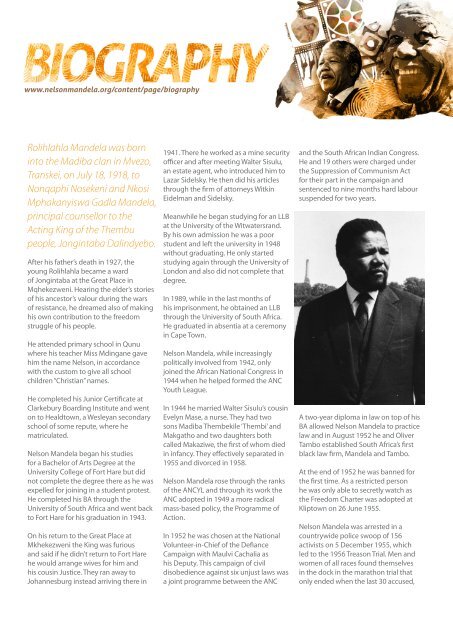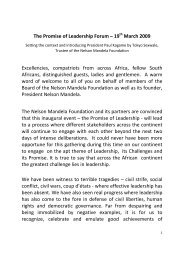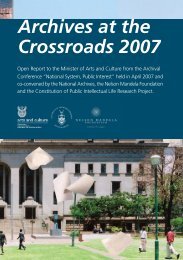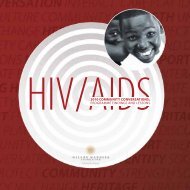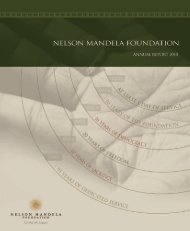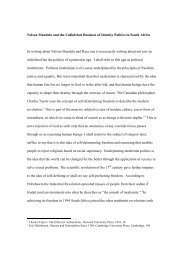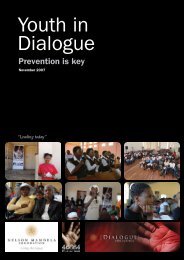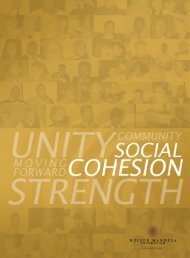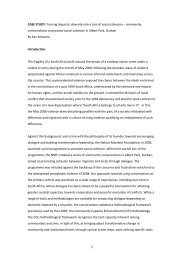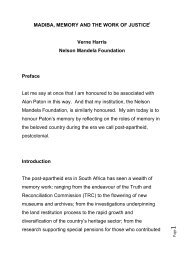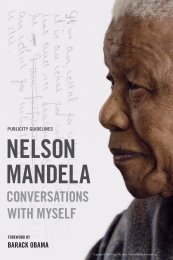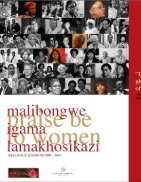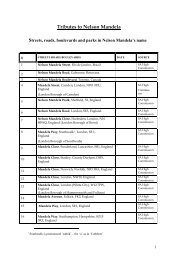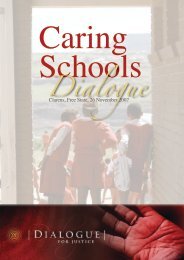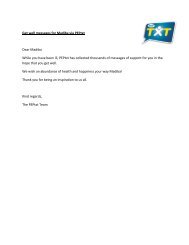Rolihlahla Mandela was born into the Madiba clan in Mvezo ...
Rolihlahla Mandela was born into the Madiba clan in Mvezo ...
Rolihlahla Mandela was born into the Madiba clan in Mvezo ...
Create successful ePaper yourself
Turn your PDF publications into a flip-book with our unique Google optimized e-Paper software.
www.nelsonmandela.org/content/page/biography<br />
<strong>Rolihlahla</strong> <strong>Mandela</strong> <strong>was</strong> <strong>born</strong><br />
<strong><strong>in</strong>to</strong> <strong>the</strong> <strong>Madiba</strong> <strong>clan</strong> <strong>in</strong> <strong>Mvezo</strong>,<br />
Transkei, on July 18, 1918, to<br />
Nonqaphi Nosekeni and Nkosi<br />
Mphakanyiswa Gadla <strong>Mandela</strong>,<br />
pr<strong>in</strong>cipal counsellor to <strong>the</strong><br />
Act<strong>in</strong>g K<strong>in</strong>g of <strong>the</strong> Thembu<br />
people, Jong<strong>in</strong>taba Dal<strong>in</strong>dyebo.<br />
After his fa<strong>the</strong>r’s death <strong>in</strong> 1927, <strong>the</strong><br />
young <strong>Rolihlahla</strong> became a ward<br />
of Jong<strong>in</strong>taba at <strong>the</strong> Great Place <strong>in</strong><br />
Mqhekezweni. Hear<strong>in</strong>g <strong>the</strong> elder’s stories<br />
of his ancestor’s valour dur<strong>in</strong>g <strong>the</strong> wars<br />
of resistance, he dreamed also of mak<strong>in</strong>g<br />
his own contribution to <strong>the</strong> freedom<br />
struggle of his people.<br />
He attended primary school <strong>in</strong> Qunu<br />
where his teacher Miss Md<strong>in</strong>gane gave<br />
him <strong>the</strong> name Nelson, <strong>in</strong> accordance<br />
with <strong>the</strong> custom to give all school<br />
children “Christian” names.<br />
He completed his Junior Certificate at<br />
Clarkebury Board<strong>in</strong>g Institute and went<br />
on to Healdtown, a Wesleyan secondary<br />
school of some repute, where he<br />
matriculated.<br />
Nelson <strong>Mandela</strong> began his studies<br />
for a Bachelor of Arts Degree at <strong>the</strong><br />
University College of Fort Hare but did<br />
not complete <strong>the</strong> degree <strong>the</strong>re as he <strong>was</strong><br />
expelled for jo<strong>in</strong><strong>in</strong>g <strong>in</strong> a student protest.<br />
He completed his BA through <strong>the</strong><br />
University of South Africa and went back<br />
to Fort Hare for his graduation <strong>in</strong> 1943.<br />
On his return to <strong>the</strong> Great Place at<br />
Mkhekezweni <strong>the</strong> K<strong>in</strong>g <strong>was</strong> furious<br />
and said if he didn’t return to Fort Hare<br />
he would arrange wives for him and<br />
his cous<strong>in</strong> Justice. They ran away to<br />
Johannesburg <strong>in</strong>stead arriv<strong>in</strong>g <strong>the</strong>re <strong>in</strong><br />
1941. There he worked as a m<strong>in</strong>e security<br />
officer and after meet<strong>in</strong>g Walter Sisulu,<br />
an estate agent, who <strong>in</strong>troduced him to<br />
Lazar Sidelsky. He <strong>the</strong>n did his articles<br />
through <strong>the</strong> firm of attorneys Witk<strong>in</strong><br />
Eidelman and Sidelsky.<br />
Meanwhile he began study<strong>in</strong>g for an LLB<br />
at <strong>the</strong> University of <strong>the</strong> Witwatersrand.<br />
By his own admission he <strong>was</strong> a poor<br />
student and left <strong>the</strong> university <strong>in</strong> 1948<br />
without graduat<strong>in</strong>g. He only started<br />
study<strong>in</strong>g aga<strong>in</strong> through <strong>the</strong> University of<br />
London and also did not complete that<br />
degree.<br />
In 1989, while <strong>in</strong> <strong>the</strong> last months of<br />
his imprisonment, he obta<strong>in</strong>ed an LLB<br />
through <strong>the</strong> University of South Africa.<br />
He graduated <strong>in</strong> absentia at a ceremony<br />
<strong>in</strong> Cape Town.<br />
Nelson <strong>Mandela</strong>, while <strong>in</strong>creas<strong>in</strong>gly<br />
politically <strong>in</strong>volved from 1942, only<br />
jo<strong>in</strong>ed <strong>the</strong> African National Congress <strong>in</strong><br />
1944 when he helped formed <strong>the</strong> ANC<br />
Youth League.<br />
In 1944 he married Walter Sisulu’s cous<strong>in</strong><br />
Evelyn Mase, a nurse. They had two<br />
sons <strong>Madiba</strong> Thembekile ‘Thembi’ and<br />
Makgatho and two daughters both<br />
called Makaziwe, <strong>the</strong> first of whom died<br />
<strong>in</strong> <strong>in</strong>fancy. They effectively separated <strong>in</strong><br />
1955 and divorced <strong>in</strong> 1958.<br />
Nelson <strong>Mandela</strong> rose through <strong>the</strong> ranks<br />
of <strong>the</strong> ANCYL and through its work <strong>the</strong><br />
ANC adopted <strong>in</strong> 1949 a more radical<br />
mass-based policy, <strong>the</strong> Programme of<br />
Action.<br />
In 1952 he <strong>was</strong> chosen at <strong>the</strong> National<br />
Volunteer-<strong>in</strong>-Chief of <strong>the</strong> Defiance<br />
Campaign with Maulvi Cachalia as<br />
his Deputy. This campaign of civil<br />
disobedience aga<strong>in</strong>st six unjust laws <strong>was</strong><br />
a jo<strong>in</strong>t programme between <strong>the</strong> ANC<br />
and <strong>the</strong> South African Indian Congress.<br />
He and 19 o<strong>the</strong>rs were charged under<br />
<strong>the</strong> Suppression of Communism Act<br />
for <strong>the</strong>ir part <strong>in</strong> <strong>the</strong> campaign and<br />
sentenced to n<strong>in</strong>e months hard labour<br />
suspended for two years.<br />
A two-year diploma <strong>in</strong> law on top of his<br />
BA allowed Nelson <strong>Mandela</strong> to practice<br />
law and <strong>in</strong> August 1952 he and Oliver<br />
Tambo established South Africa’s first<br />
black law firm, <strong>Mandela</strong> and Tambo.<br />
At <strong>the</strong> end of 1952 he <strong>was</strong> banned for<br />
<strong>the</strong> first time. As a restricted person<br />
he <strong>was</strong> only able to secretly watch as<br />
<strong>the</strong> Freedom Charter <strong>was</strong> adopted at<br />
Kliptown on 26 June 1955.<br />
Nelson <strong>Mandela</strong> <strong>was</strong> arrested <strong>in</strong> a<br />
countrywide police swoop of 156<br />
activists on 5 December 1955, which<br />
led to <strong>the</strong> 1956 Treason Trial. Men and<br />
women of all races found <strong>the</strong>mselves<br />
<strong>in</strong> <strong>the</strong> dock <strong>in</strong> <strong>the</strong> marathon trial that<br />
only ended when <strong>the</strong> last 30 accused,
“I have fought aga<strong>in</strong>st white dom<strong>in</strong>ation, and I have fought<br />
aga<strong>in</strong>st black dom<strong>in</strong>ation. I have cherished <strong>the</strong> ideal of a<br />
democratic and free society <strong>in</strong> which all persons live toge<strong>the</strong>r <strong>in</strong><br />
harmony and with equal opportunities. It is an ideal which I hope<br />
to live for and to achieve. But if needs be, it is an ideal for which I<br />
am prepared to die.”<br />
<strong>in</strong>clud<strong>in</strong>g Mr. <strong>Mandela</strong> were acquitted<br />
on 29 March 1961.<br />
On 21 March 1960 police killed 69<br />
unarmed people <strong>in</strong> a protest at<br />
Sharpeville aga<strong>in</strong>st <strong>the</strong> pass laws. This led<br />
to <strong>the</strong> country’s first state of emergency<br />
on 31 March and <strong>the</strong> bann<strong>in</strong>g of <strong>the</strong> ANC<br />
and <strong>the</strong> Pan Africanist Congress on 8<br />
April. Nelson <strong>Mandela</strong> and his colleagues<br />
<strong>in</strong> <strong>the</strong> Treason Trial were among <strong>the</strong><br />
thousands deta<strong>in</strong>ed dur<strong>in</strong>g <strong>the</strong> state of<br />
emergency.<br />
Dur<strong>in</strong>g <strong>the</strong> trial on 14 June 1958 Nelson<br />
<strong>Mandela</strong> married a social worker W<strong>in</strong>nie<br />
Madikizela. They had two daughters<br />
Zenani and Z<strong>in</strong>dziswa. The couple<br />
divorced <strong>in</strong> 1996.<br />
Days before <strong>the</strong> end of <strong>the</strong> Treason<br />
Trial Nelson <strong>Mandela</strong> travelled to<br />
Pietermaritzburg to speak at <strong>the</strong> All-<strong>in</strong><br />
Africa Conference, which resolved<br />
he should write to Prime M<strong>in</strong>ister<br />
Verwoerd request<strong>in</strong>g a non-racial<br />
national convention, and to warn that<br />
should he not agree <strong>the</strong>re would be<br />
a national strike aga<strong>in</strong>st South Africa<br />
becom<strong>in</strong>g a republic. As soon as he<br />
and his colleagues were acquitted <strong>in</strong><br />
<strong>the</strong> Treason Trial Nelson <strong>Mandela</strong> went<br />
underground and began plann<strong>in</strong>g a<br />
national strike for 29, 30 and 31 March.<br />
In <strong>the</strong> face of a massive mobilization<br />
of state security <strong>the</strong> strike <strong>was</strong> called<br />
off early. In June 1961 he <strong>was</strong> asked to<br />
lead <strong>the</strong> armed struggle and helped to<br />
establish Umkhonto weSizwe (Spear of<br />
<strong>the</strong> Nation).<br />
On 11 January 1962 us<strong>in</strong>g <strong>the</strong> adopted<br />
name David Motsamayi, Nelson <strong>Mandela</strong><br />
left South Africa secretly. He travelled<br />
around Africa and visited England to<br />
ga<strong>in</strong> support for <strong>the</strong> armed struggle. He<br />
received military tra<strong>in</strong><strong>in</strong>g <strong>in</strong> Morocco<br />
and Ethiopia and returned to South<br />
Africa <strong>in</strong> July 1962. He <strong>was</strong> arrested <strong>in</strong> a<br />
police roadblock outside Howick on 5<br />
August while return<strong>in</strong>g from KwaZulu-<br />
Natal where he briefed ANC President<br />
Chief Albert Luthuli about his trip.<br />
He <strong>was</strong> charged with leav<strong>in</strong>g <strong>the</strong> country<br />
illegally and <strong>in</strong>cit<strong>in</strong>g workers to strike.<br />
He <strong>was</strong> convicted and sentenced to five<br />
years imprisonment which he began<br />
serv<strong>in</strong>g <strong>in</strong> Pretoria Local Prison. On 27<br />
May 1963 he <strong>was</strong> transferred to Robben<br />
Island and returned to Pretoria on 12<br />
June. With<strong>in</strong> a month police raided a<br />
secret hide-out <strong>in</strong> Rivonia used by ANC<br />
and Communist Party activists and<br />
several of his comrades were arrested.<br />
In October 1963 Nelson <strong>Mandela</strong> jo<strong>in</strong>ed<br />
n<strong>in</strong>e o<strong>the</strong>rs on trial for sabotage <strong>in</strong><br />
what became known as <strong>the</strong> Rivonia<br />
Trial. Fac<strong>in</strong>g <strong>the</strong> death penalty his words<br />
to <strong>the</strong> court at <strong>the</strong> end of his famous<br />
‘Speech from <strong>the</strong> Dock’ on 20 April 1964<br />
became immortalized:<br />
“I have fought aga<strong>in</strong>st white dom<strong>in</strong>ation,<br />
and I have fought aga<strong>in</strong>st black<br />
dom<strong>in</strong>ation. I have cherished <strong>the</strong> ideal of<br />
a democratic and free society <strong>in</strong> which<br />
all persons live toge<strong>the</strong>r <strong>in</strong> harmony and<br />
with equal opportunities. It is an ideal<br />
which I hope to live for and to achieve.<br />
But if needs be, it is an ideal for which I<br />
am prepared to die.”<br />
On 11 June 1964 Nelson <strong>Mandela</strong> and<br />
seven o<strong>the</strong>r accused Walter Sisulu,<br />
Ahmed Kathrada, Govan Mbeki,<br />
Raymond Mhlaba, Denis Goldberg,<br />
Elias Motsoaledi and Andrew Mlangeni<br />
were convicted and <strong>the</strong> next day were<br />
sentenced to life imprisonment. Denis<br />
Goldberg <strong>was</strong> sent to Pretoria Prison<br />
because he <strong>was</strong> white while <strong>the</strong> o<strong>the</strong>rs<br />
went to Robben Island.<br />
Nelson <strong>Mandela</strong>’s mo<strong>the</strong>r died <strong>in</strong> 1968<br />
and his eldest son Thembi <strong>in</strong> 1969. He<br />
<strong>was</strong> not allowed to attend <strong>the</strong>ir funerals.<br />
On 31 March 1982 Nelson <strong>Mandela</strong><br />
<strong>was</strong> transferred to Pollsmoor Prison<br />
<strong>in</strong> Cape Town with Sisulu, Mhlaba and<br />
Mlangeni. Kathrada jo<strong>in</strong>ed <strong>the</strong>m <strong>in</strong><br />
October. When he returned to <strong>the</strong> prison<br />
<strong>in</strong> November 1985 after prostate surgery<br />
Nelson <strong>Mandela</strong> <strong>was</strong> held alone. Justice<br />
M<strong>in</strong>ister Kobie Coetsee had visited<br />
him <strong>in</strong> hospital. Later Nelson <strong>Mandela</strong><br />
<strong>in</strong>itiated talks about an ultimate meet<strong>in</strong>g<br />
between <strong>the</strong> apar<strong>the</strong>id government and<br />
<strong>the</strong> ANC.<br />
In 1988 he <strong>was</strong> treated for Tuberculosis<br />
and <strong>was</strong> transferred on 7 December<br />
1988 to a house at Victor Verster Prison<br />
near Paarl. He <strong>was</strong> released from its gates<br />
on Sunday 11 February 1990, n<strong>in</strong>e days<br />
after <strong>the</strong> unbann<strong>in</strong>g of <strong>the</strong> ANC and<br />
<strong>the</strong> PAC and nearly four months after<br />
<strong>the</strong> release of <strong>the</strong> rema<strong>in</strong><strong>in</strong>g Rivonia<br />
comrades. Throughout his imprisonment<br />
he had rejected at least three conditional<br />
offers of release.<br />
Nelson <strong>Mandela</strong> immersed himself <strong><strong>in</strong>to</strong><br />
official talks to end white m<strong>in</strong>ority rule<br />
and <strong>in</strong> 1991 <strong>was</strong> elected ANC President<br />
to replace his ail<strong>in</strong>g friend Oliver Tambo.<br />
In 1993 he and President FW de Klerk<br />
jo<strong>in</strong>tly won <strong>the</strong> Nobel Peace Prize and on<br />
27 April 1994 he voted for <strong>the</strong> first time<br />
<strong>in</strong> his life.<br />
On 10 May 1994 he <strong>was</strong> <strong>in</strong>augurated<br />
South Africa’s first democratically elected<br />
President. On his 80th birthday <strong>in</strong> 1998<br />
he married Graça Machel, his third wife.<br />
True to his promise Nelson <strong>Mandela</strong><br />
stepped down <strong>in</strong> 1999 after one term as<br />
President. He cont<strong>in</strong>ued to work with <strong>the</strong><br />
Nelson <strong>Mandela</strong> Children’s Fund he set<br />
up <strong>in</strong> 1995 and established <strong>the</strong> Nelson<br />
<strong>Mandela</strong> Foundation and The <strong>Mandela</strong>-<br />
Rhodes Foundation.<br />
In April 2007 his grandson Mandla<br />
<strong>Mandela</strong> became head of <strong>the</strong> <strong>Mvezo</strong><br />
Traditional Council at a ceremony at <strong>the</strong><br />
<strong>Mvezo</strong> Great Place.<br />
Nelson <strong>Mandela</strong> never wavered <strong>in</strong> his<br />
devotion to democracy, equality and<br />
learn<strong>in</strong>g. Despite terrible provocation, he<br />
never answered racism with racism. His<br />
life has been an <strong>in</strong>spiration to all who are<br />
oppressed and deprived, to all who are<br />
opposed to oppression and deprivation.<br />
www.nelsonmandela.org


